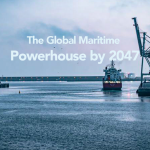Listen to the audio version of the blog here:
As global warming and climate change continue to pose significant challenges, sustainability has now become the focus across various industries. In the maritime sector, reducing sulphur emissions has become a major concern. The reason behind this is that sulphur emissions damage the environment, stunting growth and weakening the foliage of plants, and are harmful to human health, causing respiratory problems like asthma.
In 2020, the International Maritime Organisation (IMO) enforced stringent sulphur emission regulations under the MARPOL convention. These regulations mandated that ships worldwide must reduce their sulphur emissions from 3.5% to 0.5%. Despite these efforts, there remains a need for an even cleaner, more sustainable fuel alternative to reduce emissions further and mitigate the effects of climate change. The solution? Methanol.
Methanol as the Better Alternative
- Methanol, a fuel derived from biomass or renewable materials, is proving to be a cleaner and more sustainable option.
- It significantly reduces sulphur emissions by up to 99% and nitrogen emissions by 60%.
- It is readily available around the world, making it a convenient and cost-effective option for maritime logistics.
One of the key advantages of methanol is its environmental impact. While conventional fuel leaks can cause irreversible damage to marine ecosystems, methanol dissolves quickly in water, causing minimal harm to aquatic life. This makes it a safer option for the environment.
Methanol Dual-Fuel Engines: A Step Towards a Greener Future
To make the transition to methanol, many maritime logistics companies are investing in methanol dual-fuel engines. These engines can run on both conventional fuel and methanol, allowing for a gradual and smooth shift to a more sustainable energy source. Furthermore, methanol as a liquid fuel requires only minor modifications to existing fuel storage infrastructures, making the transition easier and more practical.
Leading logistics company – Maersk is already on the way to this transformation. Maersk has already launched three methanol dual-fuel vessels, with a fourth, the Albert Maersk, was launched on February 2025 in Mumbai, India. This marks a significant milestone in Green Logistics and sets a strong example for others in the industry.
While methanol has numerous benefits, it is important to note that it is toxic to humans even in small quantities. Therefore, ensuring strict safety protocols is essential when handling and using methanol as a fuel.
The future of Maritime Logistics is already taking shape with methanol-powered engines. The green methanol ships market is projected to grow from 30 units in 2025 to 274 units by 2035, reflecting a substantial increase in adoption. As the demand for cleaner, greener shipping solutions grows, methanol stands at the forefront, offering a sustainable and effective solution for the shipping industry.



